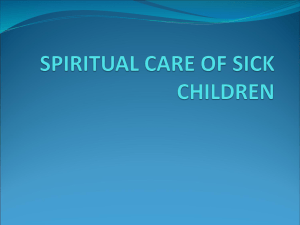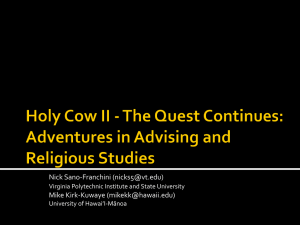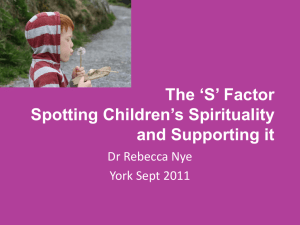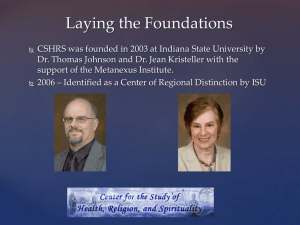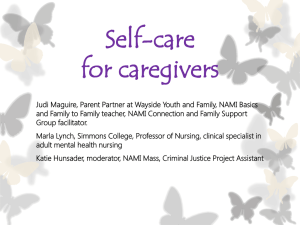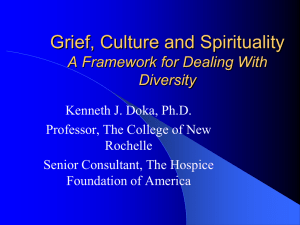Spiritual care module
advertisement
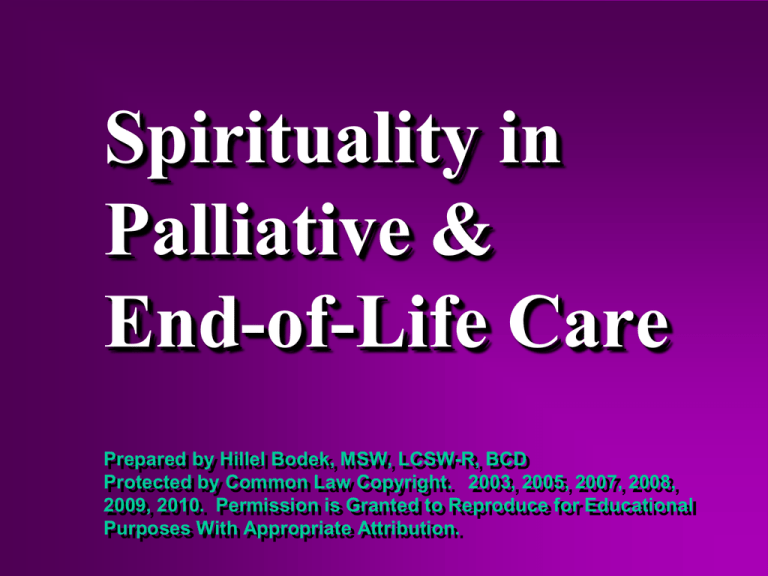
Spirituality in Palliative & End-of-Life Care Prepared by Hillel Bodek, MSW, LCSW-R, BCD Protected by Common Law Copyright. 2003, 2005, 2007, 2008, 2009, 2010. Permission is Granted to Reproduce for Educational Purposes With Appropriate Attribution. Objectives . . . Define spirituality Differentiate between spirituality and religion Explain the importance of spirituality in palliative & EOL Care Discuss the interrelationship between the spiritual elements and physical, emotional and social factors in patient assessment and treatment . . . Objectives List the various elements of spirituality and be able to assess them Identify key spiritual issues and be able to address them Demonstrate the ability to integrate the elements of spirituality into the overall care and treatment of patients and their families Spirituality . . . Spirituality is the culmination of a person’s quest to discover the ultimate and transcendent meaning and purpose of his/her life. Spirituality reflects the essence and substance of that person - the values, thoughts, emotions, motivations, dreams, experiences, assumptions and relationships that make the person a unique individual. . . . Spirituality . . . Spirituality provides the individual with the vitality, drive and determination to develop and function as a fully actualized person. Spirituality is not static; it changes over time in response to external events and the person’s ever-developing and evolving sense of self. HILLEL BODEK, MSW, LCSW-R, BCD August, 2003 . . . Spirituality “Spirituality is the aspect of humanity that refers to the way individuals seek and express meaning and purpose and the way they experience their connectedness to the moment, to self, to others, to nature, and to the significant or sacred.” National Consensus Panel Report, Improving the Quality of Spiritual Care as a Dimension of Palliative Care: The Report of the Consensus Conference, October, 2009. Religion Religion is the belief in and worship of a superhuman controlling power, especially a personal God or gods Religion is a particular system of faith and worship. Spirituality & Religion Religion can impact on a person’s development of his/her spirituality Religion can help provide answers to spiritual questions Spirituality can be expressed, in whole or in part, through religion A person may have a well-developed spirituality without believing in God or practicing a religion Importance of Spirituality in Palliative & EOL Care . . . Spirituality impacts on the quality of life for chronically and terminally ill patients Healthy spirituality has a positive effect on physiological functioning while spiritual distress has a negative effect on physiological functioning Addressing spiritual issues helps dying patients gain needed closure to achieve a peaceful “good” death Importance of Spirituality . . . Addressing spiritual issues has a positive impact on the patient’s psychological (emotional – mental) well-being In order to address effectively “total pain” in palliative care, we must address a patient’s spiritual pain Spirituality is a reflection of the patient’s individual self Importance of Spirituality . . . Spirituality is an important part of a person’s functioning and must be assessed and addressed to provide holistic – patient focused care Understanding a patient’s spirituality is crucial to understanding him/her and how he/she deals with illness, death and bereavement . . . Importance of Spirituality The process of exploring a person’s spirituality facilitates the development of a good clinician-patient relationship and enhances that relationship Addressing spiritual issues helps empower patients and facilitates appropriate goal setting & good treatment planning that meet the patient’s individual needs and desires Elements of Spirituality . . . Values & beliefs Experiences Assumptions Motivations Dreams Relationships Thoughts Emotions Elements of Spirituality . . . Values & beliefs . . . Values & beliefs are inculcated in all of us as we grow up By observing how those around us behave By being taught by our family, friends and teachers Values & beliefs change as a result of societal pressures, particularly from peers Elements of Spirituality . . . . . . Values & beliefs Values & beliefs change as a result of other life experiences Values & beliefs can be assessed by asking about Legacy from parents and family The impact of the most influential people in the patient’s life What values & beliefs the patient espouses / is guided by Elements of Spirituality . . . Experiences . . . Our life experiences shape how we view ourselves, our environment and our relationships Thus, as we go on throughout life, experiences, positive and negative, impact on our spirituality Elements of Spirituality . . . . . . Experiences Experiences can be assessed by asking about the most positive and negative experiences in a patient’s life and how these have effected him/her memories, good and bad, that the patient keeps thinking about events the patient believes have had a special impact on him/her Elements of Spirituality . . . Assumptions . . . As we grow & develop throughout life, we develop an assumptive world (a life plan), the way we think and wish our lives will progress and how we will fit into our environment The assumptions we make about all areas of our lives are subject to change based on new experiences that alter, voluntarily or not, the paths we have taken Elements of Spirituality . . . . . . Assumptions Assumptions can be assessed by asking about how the patient’s illness or injury has altered his/her life plans what things the patient had hoped to achieve in life that have not been achieved what the patient would change about his/her life if he/she could go back Elements of Spirituality . . . Motivations . . . Different things motivate different people (experiences, feelings, thoughts, beliefs, dreams) Motivations can be positive or negative Motivations change over time as a person has new experiences and alters his/her assumptive world / life plan Elements of Spirituality . . . . . . Motivations Motivations can be assessed by asking about what has guided the patient’s major choices in life what is guiding the patient’s decision-making so far during the course of his/her illness or injury to the present time Elements of Spirituality . . . Dreams . . . Dreams are hopes and aspirations, questionably attainable, for which a person yearns The achievement or failure to achieve dreams and aspirations can be disappointing both when they are realized and when they are not Dreams motivate us and provide us with hope and things to work toward Elements of Spirituality . . . Dreams . . . Dreams help shape our lives, particularly our spirituality & sense of self Dreams can be assessed by asking about . . what dreams/hopes the patient has had at different times in his/her life how and why those dreams/hopes were achieved, altered or abandoned Elements of Spirituality . . . . . . Dreams . . . Dreams can be assessed by asking about how did the resolution of those dreams/hopes affect his/her life does the patient have any important dreams/hopes that remain unfulfilled how are those unfulfilled dreams impacting on the patient now Elements of Spirituality . . . Relationships . . . Relationships give us a sense of being a part of the world, of being loved and accepted, and of being valued and cared for Relationships are a crucial element in a person’s development of his/her sense of self, spirituality and emotional well-being Elements of Spirituality . . . Relationships . . . Difficulties in relationships can have a lifelong negative impact on a person’s development and functioning, self-worth, and self-confidence Family and peer-group relationships are both crucial to normal human development Elements of Spirituality . . . Relationships . . . Relationships can be assessed by asking about . . . the patient’s relationships with various family members and how these have evolved over the years the patient’s peer group relationships and how these have evolved over the years Elements of Spirituality . . . Relationships . . . Relationships can be assessed by asking about . . . who are the patient’s main emotional supporters which relationships that failed does the patient mourn for, if any how those failed relationships have affected his/her life Elements of Spirituality . . . . . . Relationships . . . Relationships can be assessed by asking about which relationships, if any, would the patient like to attempt to change or resolve what does the patient think would need to happen to accomplish that how would accomplishing that, or failing to do so, affect the patient Elements of Spirituality . . . Thoughts . . . How we think What topics generally recur in our thinking Are we stimulated more by our own thoughts than by our environment Do we think more about ourselves or are our thoughts more focused on others and the world around us Elements of Spirituality . . . Thoughts . . . Thoughts can be assessed by asking about . . . what thoughts are prevalent in the patient’s recent past how do those thoughts affect him/her Elements of Spirituality . . . Thoughts . . . Thoughts can be assessed by asking . . . are there topics the patient thinks about which cause him/her distress and, if so, in what way if the patient is motivated more by his/her thinking or his/her environment Elements of Spirituality . . . . . . Thoughts . . . Thoughts can be assessed by asking if the patient’s thoughts turn more often to issues about himself/herself or about others or about what’s happening around him/her if the patient feels uncomfortable when he/she think about himself/herself, others or what’s happening in the world around him/her Elements of Spirituality . . . Emotions . . . We all experience a range of emotions in response to different situations We all experience a range of emotions in response to different memories Emotions, particularly those that are experienced regularly, help shape our lives, our behavior, our sense of self, and our spirituality in important ways Elements of Spirituality . . . Emotions . . . Common emotions are anxiety or fear sadness loneliness happiness anger frustration guilt shame / embarrassment Elements of Spirituality . . . Emotions . . . Emotions can be assessed by asking . . . asking what emotions the patient experiences frequently what brings on those feelings how long do the feelings last what impact do they have on the patient Elements of Spirituality . . . Emotions . . . Emotions can be assessed by asking . . . how does the person deal with these feelings is this method of dealing with the feelings helpful how do these feelings impact on the person . . . Elements of Spirituality . . . Emotions . . . Emotions can be assessed by exploring the memories or experiences that trigger them asking how the patient views these triggers determining if these emotional responses are long-standing / well ingrained Spiritual Issues . . . Arise out of needs and desires Desire for forgiveness Need to forgive Desire for closure Need for affirmation of his/her life and its value/meaning Hope for a peaceful & painless death Hope for death Hope for legacy Concern for loved ones left behind . . . Spiritual Issues Arise out of fear Fear of death Fear of pain Fear of the unknown Fear of loneliness / abandonment Non-acceptance of death or disability Addressing Spiritual Issues . . . Assessment Assess the spiritual elements involved with regard to the issue Assure patient that there is no pressure on them to discuss issues which they do not want to GENTLY explore spiritual elements and issues using open-ended inquiries Allow the process of addressing spiritual issues to proceed at an appropriate pace which is comfortable for the patient Addressing Spiritual Issues . . . Communication & Relationship Building (Active Listening) Listen to patients, let them tell their story Be attentive to what the patient is saying verbally and through mannerisms Indicate that you are sincerely interested in learning about the patient and helping him or her Listen for the latent content & concerns Addressing Spiritual Issues . . . Support Make supportive comments as appropriate Be present for the patient – Ministry of Presence Help patients maintain their dignity Take care not to impose your culture, personal values and beliefs on the patient or family Addressing Spiritual Issues . . . Planning for Intervention . . . Consider the likelihood of being able to resolve the issues presented Consider the risks (of failing to resolve an issue) and benefits of attempting to do so by exploring this with the patient Work with the patient to develop a set of step-by-step realistic goals Addressing Spiritual Issues . . . Planning for Intervention . . . Regularly revisit and reassess the goals and the plans to achieve them Help the patient’s family & loved ones by providing support, solace, spiritual strength and presence Help patients maintain human connections If practical, help patients maintain a connection with their loved pets Addressing Spiritual Issues . . . . . . Planning for Intervention Focus on supporting and preserving the patient’s humanity & dignity In end-of-life care help the patient towards a peaceful (“good”) death In cases of chronic illness or disability help the patient and family toward acceptance and constructive adaptation Addressing Spiritual Issues . . . Special Interventions . . . Life review which touches on the elements of spirituality and spiritual issues noted above Help the patient maintain connections to friends, loved ones and his/her community Help patient, loved ones and friends cope with anticipatory grief Addressing Spiritual Issues . . . Special Interventions . . . Help patient clarify his/her wishes, hopes, decision-making and beliefs Support patient autonomy Respect and focus on patient’s humanity and individuality Encourage patients to tell you what they need/want from you Addressing Spiritual Issues . . . Special Interventions . . . Take time to ask about and understand the patient’s / family’s cultural and religious beliefs and customs Listen to patient’s and family’s concerns and address them directly Ethical wills and other communications as a legacy to family, loved ones & friends . . . Addressing Spiritual Issues . . .Special Interventions Alter the surrounding environment Counseling & education to address emotional/spiritual distress Dignity preserving care Don’t be put off if the patient doesn’t wish to speak about spiritual issues – he or she or you can bring it up again What makes a “good death” Pain & symptom management Clear decision making Preparation for death Completion Contributing to others Affirmation of the whole person Steinhauser et al, Annals Intern Med 2000 (Durham VA) Good death as defined by physicians, nurses, social workers, chaplains, hospice volunteers, patients, bereaving family (N=75) “No man is an island unto himself. ” John Donne “The deepest principle in human nature is the craving to be appreciated.” WILLIAM JAMES “The greatest use of a life is to spend it on something that will outlast it.” WILLIAM JAMES Spiritual Questions . . . Why me? Is my illness a punishment? Why was I placed on earth? Is there hope? How can I be forgiven? How can I forgive? Spiritual Questions . . . What will the last hours of life be like? Will death hurt? Will I have to suffer? Why do I have to suffer? What is the purpose of dragging out my life? I don’t want to live without a certain quality of life. Is it OK to say goodbye, to let go? . . . Spiritual Questions Is there a God? What happens after death? Will I be punished or forgiven for my sins? Will I be alone? Will I be remembered? Addressing Spiritual Questions . . . In dealing with spiritual questions . . . Listen to and explore the patient’s views Universalize the patient’s concerns, thoughts and feelings Provide support Make sure your culture, values and beliefs don’t get in the way of helping the patient and family Addressing Spiritual Questions . . . In dealing with spiritual questions . . . Recognize and focus on the latent content and concerns Don’t be sidetracked by the manifest questions which defy being answered directly or satisfactorily Take care not to impose your culture, values and beliefs on the patient and family . . .Addressing Spiritual Questions . . . In dealing with spiritual questions Help the patient find answers and solutions which address his/her concerns that arise from the latent content of the spiritual questions Work to assure the patient’s dignity Spirituality in Palliative & End-of-Life Care Summary


